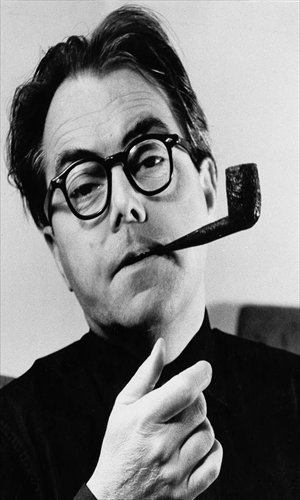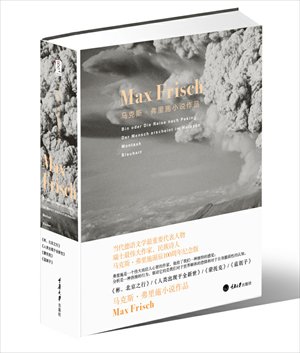
Swiss playwright and novelist Max Frisch (above). Photo: Courtesy of the Swiss Embassy

With a reputation as one of the post-WWII greats of German-language literature, Swiss novelist and playwright Max Frisch (1911-1991) whose best known works include drama Andorra (1961) and the novels Stiller (1954) and Homo Faber (1957), enjoyed fame throughout his career not only in Europe but in the US as well. He courted controversy for leveling criticism at his country, yet one of the lesser known productions he was at the helm of was his play The Fire Raisers in Beijing in the late 1980s.
To mark his 100th birth anniversary last year, four of his novels were translated and published in Chinese for the first time by Chu Chen Books. The collection, launched on Sunday, consists of his early work of Bin or Trip to Beijing (1944), and later works such as Man in the Holocene (1979), Montauk (1975) and Bluebeard (1982).
Few Chinese novelists explore issues related to humanity the same way Frisch did, said Chu Chen, manager of Chu Chen Books.
During Sunday's launch of Frisch's books, Chu noted many questions asked by the author remain relevant today and provide readers with food for thought.
A successful architect before he achieved fame with breakout 1949 play When the War Was Over, Frisch brought international recognition to the post-war Swiss theater scene along with compatriot dramatist Friedrich Dürrenmatt. Frisch's works deal with social and political problems, such as post-war guilt, origins of Nazism and confrontation of personal problems.
In Bin or the Trip to Beijing, the author escapes from his middle-class life and takes on an imagined journey with his companion Bin along the Great Wall of China. Considered as "escape literature" by Frisch himself, the novel jumps back and forth between the past, future and present. It focuses more on inner conflicts than on the political situation in Europe during World War II.
Man in the Holocene is about an elderly widower Geiser who is stuck in his house in a valley in Switzerland by incessant torrential rains. Plagued by concerns that his village might be wiped out by an avalanche and by his loss of memory, he writes memoirs down on paper and posts them to a wall. A distinctive feature of this book is the use of reprinted cutouts which Geiser removes from several encyclopedias, the Bible and other books.
Montauk, a fictional novel about nature, is considered by many as Frisch's autobiography as it offers deep insight into his life. Frisch documents his experiences, including his relationship with his female lovers. Although his frankness is met by criticism, the book is hailed by many as his most important work. An adaptation of an ancient story of a malicious knight who killed his six wives, Frisch set his version of Bluebeard in modern Zurich. The protagonist is a middle-aged physician accused of strangling a call girl and his sixth wife, haunted by memories of a trial and by visions of the victim's life as a prostitute after their divorce.
"As far as I know, there is no other writer who can describe crime as Frisch did," said Chu. "Many of his works are written in a poetic way. Frisch once said he was surrounded by horror, but the horror he talked about is not evil. Rather, it's presented it in a rather beautiful way."

Copyright ©1999-2011 Chinanews.com. All rights reserved.
Reproduction in whole or in part without permission is prohibited.